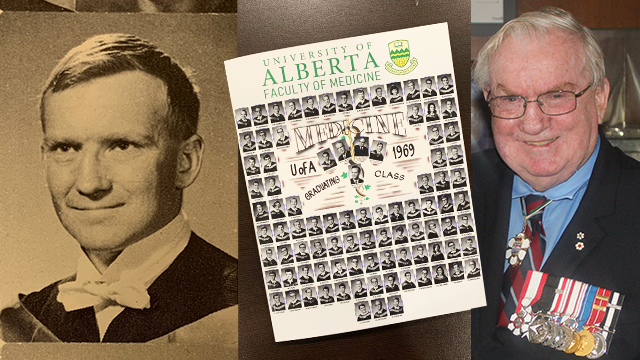
John Blatherwick, '69 MD, is known as one of British Columbia's fiercest public health advocates in senior administrative roles including Chief Medical Health Officer and Vice-President Public Health for Vancouver Coastal Health.
John Blatherwick, '69 MD, served in the Canadian military for 30 years while raising a family and establishing his impressive medical career. Faced with some of Vancouver's most challenging public health crises, he is known as one of British Columbia's fiercest public health advocates-sometimes called 'Captain Condom' by the media for his advocacy of safe sex education in schools-in senior administrative roles including Chief Medical Health Officer and Vice-President Public Health for Vancouver Coastal Health.
In the early 1970s, youth homelessness, an influx of Vietnam war veterans living with addiction, and the rise of the HIV epidemic opened Blatherwick's eyes to the need for new approaches to public health in Vancouver, and he was inspired to take action.
He became director of the Pine Street Youth Clinic, and throughout his career he worked to create awareness alongside people living with disabilities, HIV/AIDS, substance use disorders and addictions, and worked to abolish smoking in the workplace.
Insite, the first legal supervised safe injection site in North America, opened under his leadership.
Blatherwick says he was able to positively influence public opinion by forming strong ties with media.
"Once I learned that you really didn't have to fear the press, it worked in my favour. I got to battle the AIDS epidemic from the front pages of the newspaper, on the evening news, radio and television, and all the talk shows. I felt that was more valuable than hiding from the press."
Blatherwick's accomplishments have earned him many accolades, including membership in the Order of Canada in 1994, and the Queen's Golden Jubilee Medal in 2002.
A physician in uniform
John Blatherwick's early life prepared him for a military career, though he didn't know it at the time. With a father in a senior role in the Royal Canadian Air Force (RCAF), a childhood spent relocating between air force bases, and a tendency to say 'yes' when asked for help, Blatherwick was a natural fit for military service.
At 16 years old Blatherwick served in the Governor General's Foot Guards in Ottawa, setting in motion a series of "favours" that resulted in taking on progressively senior military roles.
While studying medicine at the University of Alberta, he joined number 107 University Squadron (RCAF) followed by number 418 'City of Edmonton' Squadron (RCAF). As an Internal Medicine Resident in Calgary, Blatherwick agreed to help out the local unit, eventually landing him the title of commanding officer.
When he began work at UBC, Blatherwick was invited to help at HMCS Discovery, a Royal Canadian Navy Reserve facility based in Vancouver, where he served for 29 years. After retiring from HMCS Discovery in 2000 as Senior Naval Reserve Medical Advisor, he served six years as an Honorary Colonel of 12 (Vancouver) Field Ambulance, part of the Royal Canadian Health Services Group (RCHSG).
"I've travelled all over Europe and met a lot of interesting people that I will not forget," Blatherwick said. "To my great surprise, my son is now the first Lieutenant at HMCS Discovery, so I still have a close connection to the military and I still know all the people down there."
Keeping in touch through storytelling
Now a University of British Columbia professor emeritus, Blatherwick prioritizes time with his four children and 10 grandchildren, and he is looking forward to reconnecting with friends from his youth. This year marks the 50th golden anniversary of Blatherwick's graduating MD class of 1969, who will reunite at the U of A Alumni Weekend from September 19-22, 2019 in Edmonton.
"We had a mini reunion four years ago and it was just as though time stood still. It was the same group of people except now we had their family and life experiences to add to the discussion. I really looked forward to chatting about what they've done over their lifetime and sharing our stories."
To mark the occasion, Blatherwick researched, compiled and published a keepsake book containing updates and stories on each of his classmates, as a gift and tribute to some of his oldest friends. Creating books like this one have become a way for him to stay connected to the people and stories that he has come to know throughout his career.
"I started to collect these stories and I suddenly realized that these incredible stories had to be told. So I made a book of biographies of my staff. It was like a yearbook. And I remember when I handed the books out, everybody was saying 'I didn't know you worked there' or 'oh yeah, I remember that story' or 'yeah, that was embarrassing.'"
Blatherwick tracked down each member of his class-which is no small task-and recommends to others not to wait 50 years before reconnecting.
"When doctors retire, they leave the profession and tracking them down is really hard," he said. "You'd better do it at 35 or 40 years so that you keep track of where the heck they are."